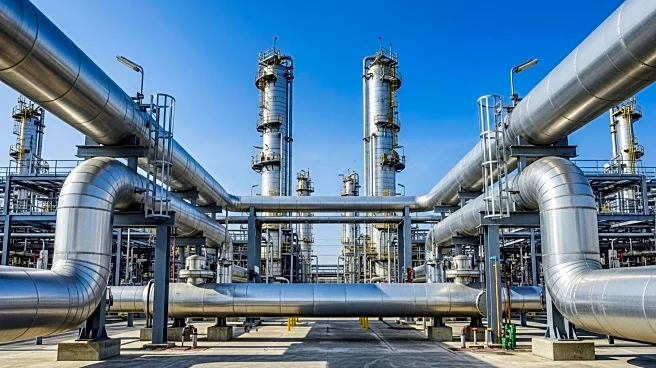What is the story about?
What's Happening?
Uganda is advancing its $4 billion oil refinery project, with operations expected to start between late 2029 and early 2030. The project, located in Kabaale, Hoima District, is a joint venture between the Uganda National Oil Company (UNOC) and UAE-based Alpha MBM Investments. It aims to transform Uganda from a crude oil exporter to a hub for refined products, reducing the region's reliance on imported fuels. The refinery will have a capacity of 60,000 barrels per day and is part of a larger industrial ecosystem in the Hoima industrial park. This initiative is part of Africa's broader strategy to enhance local refining capacity and achieve energy security.
Why It's Important?
The development of Uganda's oil refinery is significant for Africa's energy landscape, as it represents a shift towards energy independence and economic sovereignty. By reducing reliance on imported fuels, the project is expected to strengthen domestic energy security and create a cross-border trade corridor for refined fuels and petrochemicals. This move aligns with Africa's growing list of new projects aimed at ending fuel import dependence, such as Nigeria's Dangote Refinery. The success of these projects could serve as a blueprint for other African nations, potentially leading to increased economic stability and growth across the continent.
What's Next?
As the project progresses, Uganda will continue to develop the necessary infrastructure, including roads, water systems, and a high-voltage power supply. The refinery is expected to attract additional investments and serve not only Uganda's domestic market but also neighboring countries like Tanzania and the Democratic Republic of Congo. The Ugandan government is also expanding its energy portfolio to include hydro, solar, and nuclear sources, aiming for a sustainable energy base for the future. The success of this project could encourage further investments in Africa's energy sector, promoting regional cooperation and development.
Beyond the Headlines
The refinery project highlights the challenges and opportunities in Africa's energy sector. With European and American banks increasingly hesitant to finance fossil fuel projects, African nations are turning to alternative funding sources and partnerships. This shift could lead to a more self-reliant and resilient energy sector, capable of withstanding global market fluctuations. Additionally, the project's focus on petrochemicals, fertilizers, and gas processing indicates a comprehensive approach to capturing the full value chain, potentially leading to broader economic benefits beyond energy security.

















